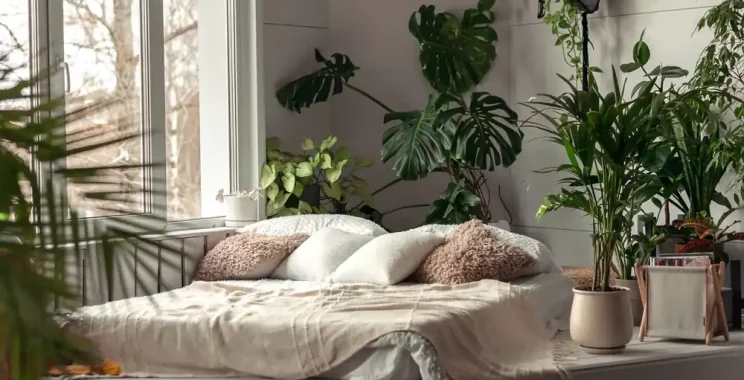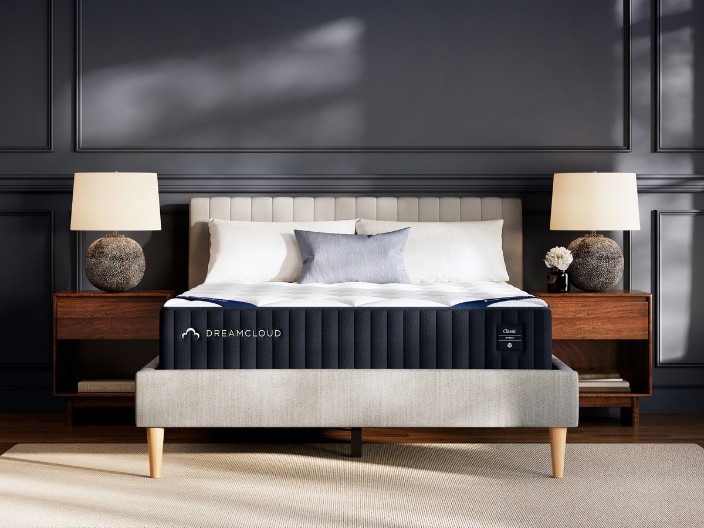Sleep Environment: What’s Important to Have in Your Bedroom
Share
Fact checked
Reviewed by experts
Updated
January 9, 2023
Quick read
5 mins to read
List of Content
While the living room may be the most popular place in the house, the bedroom is the most important. This is where you retire to rest and rejuvenate at night, so your bedroom must be a haven of peace and relaxation. But to achieve this, you need to pay close attention to your bedroom’s physical comfort and aesthetic.
This article will look at how you can make your bedroom environment ideal by following some simple yet essential tips.
Important Elements of a Relaxing Bedroom
Your bedroom is your oasis, a space to relax and escape life’s regular hustle. However, to create a truly relaxing retreat, there are a few essential elements to consider.
Temperature
If your room is too hot or cold, relaxing can be challenging. So, maintain the ideal temperature for a bedroom, which typically ranges between 60-67 degrees.
Noise
No matter if you want to create an ideal sleep environment for babies or, in general, consider soundproofing the room. You can do this by adding thick curtains or blinds to the windows and using rugs or carpets on the floor to absorb sound. White noise machines can also help mask outside noise.
Light
Proper lighting can help to set the mood in your room and make the sleep environment more inviting. You can use lamps or LED lights to create a softer, more calming ambiance.
Mattress and Bedding
Choose a mattress that is right for you in terms of firmness and support. You can also buy a down comforter or duvet that adds warmth and luxury while providing additional insulation during colder months.
9 Ways to Make Your Bedroom Better for Sleep
To get a good night’s sleep, you need to create a bedroom environment that is conducive to sleep. That means eliminating anything that might interfere with sleep, such as noise, light, and electronic devices. It also means ensuring the bedroom is comfortable, with the right temperature, humidity, and firmness of the mattress.
Here’s a sleep environment checklist to help you make your bedroom better for sleep –
Clean Out All the Clutter
The first step to better sleep is to declutter your bedroom. This means clearing off your nightstand, removing anything under your bed, and putting away any clothes on the floor.
You should also take care of any laundry needed so it doesn’t pile up and become a stressor. Lastly, clear any clutter from your dresser or closet so you can relax in a peaceful and serene space!
Ditch All Electronics
This one may seem obvious when it comes to sleep environment tips, but it’s worth keeping in mind. First, get rid of all electronic screens in your bedroom. That includes your TV, laptop, smartphone, and tablet. If you can’t part with your devices, charge them outside of the bedroom or invest in some blue light-blocking glasses to wear while you use them before bed. The blue light emitted by screens can interfere with your body’s natural sleep rhythm and make it harder to fall asleep.
Keep Your Room Dark
A lack of darkness in your bedroom can make falling and staying asleep harder. Even a tiny amount of light from a digital alarm clock can be disruptive. If you can’t make your room pitch black, try using an eye mask or investing in blackout curtains.
Keep Your Room Quiet
If you want to sleep better, one of the best things you can do is keep your room quiet. That means no loud music, TV, or talking on the phone. It is also an ideal sleep environment for newborn babies. Even if you’re unaware, noise can keep you from falling asleep. But if you live in a noisy area, you can try using a white noise machine to help drown out the outside noise.
Keep Your Room Cool
Assuming you don’t have air conditioning, you can still do plenty of things to keep your room cool. First, consider what material your sheets are made of. If they’re heavy and dense, they’re going to trap heat, so opt for lighter fabrics like cotton. Also, ensure your comforter is breathable and not too thick – the same goes for your blankets.
Another way to keep your room cool is to use a fan. You can point it directly at yourself while you sleep. Just be careful not to aim it directly at your face, which can cause drying and irritation. Finally, keep your curtains or blinds closed during the day to prevent the sun from heating your room. You can open them up at night to let in some cooler air.
Use Aromatherapy
Aromatherapy is a great way to relax before bed and improve the overall bedroom environment. In addition, many essential oils can help you sleep better, so experiment to see what works best for you. Finally, diffusers and other products can help make your bedroom more relaxing and conducive to sleep.
Paint Your Room
It’s no secret that the colors in your environment can affect your mood. Studies have shown that specific colors can increase happiness, relaxation, and productivity. So, if you’re looking for ways to make your bedroom better for sleep, consider painting your walls a calming color.
Lavender, light blue, and green are all great options, but you can also try a neutral shade like white or gray. Not only will a fresh coat of paint help you feel more relaxed, but it can also improve your sleep quality.
Use the Right Bedding
Your bed should be comfortable and inviting, so you can look forward to climbing into it at the end of the day. This means using the right bedding to create a cozy bedroom environment that promotes good sleep.
Start with a supportive mattress that meets your needs, whether firm or soft. Then add layers of comfort with plush pillows and cozy blankets. Finally, use light and breathable sheets. During winter, dress your bed with extra layers to keep you warm at night. During summer, use lighter bedding to help you stay relaxed and comfortable.
Get Comfortable Mattresses
If you want better sleep, it all starts with a comfortable mattress. Consider what mattress will work best for you. For example, consider a memory foam mattress if you have back pain. Alternatively, if you prefer a softer bed, consider a pillow-top mattress.
Conclusion
A good night’s sleep is essential for our overall health and well-being, so creating a sleep environment conducive to restful sleep is crucial. The items in your bedroom should be carefully chosen to create a peaceful place where you can unwind and recharge. Keep these tips in mind as you curate your sanctuary and enjoy the many benefits of a good night’s sleep.
FAQs
We spend more of our everyday lives in our bedrooms than in any other space—where we spend hours eating, resting, studying, working, and unwinding.
First, darken the room as much as possible to promote melatonin production and help you sleep deeper. Finally, ensure your bed is comfortable and inviting so you’re more likely to want to stay in it all night!
Start by moving the furniture. For example, if you have a bed in the middle of the room, try moving it against a wall. Then, rearrange your furniture to create a new look and feel in your bedroom. You can also add new accessories to give the room a fresh look.
Get rid of anything potentially harmful, including medication, cleaners, and other chemicals that might be within reach. Second, create a designated space such as a bed, crate, or simply a comfy spot with a blanket. Also, ensure that your dog has plenty of toys and chews to keep them occupied.
This website does not offer medical advice nor professional medical services; rather, it is provided solely for educational, informational, and/or entertainment purposes. Individuals seeking medical advice should consult a licensed physician. The information provided should not be used for diagnosis or treatment of any condition, disease, or injury. When you have a medical condition, you should always talk to licensed doctor or other certified medical professional. You should never delay seeking professional medical advice or treatment based on the contents of this website. Call 911 or immediately go to the nearest emergency room if you think you may have a medical emergency. The contents of this website are provided “as-is”, Sleep Authority and its parent, subsidiaries, affiliates, employees, contributors disclaim any warranty of the information contained herein. Please contact using contact form to report any errors, omissions, misinformation, or abuse.
Sleep Authority is brought to you by Resident, the company that brings you Nectar, DreamCloud, Awara, Wovenly, Bundle, Home Well Designed and Level Sleep.






